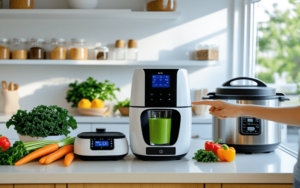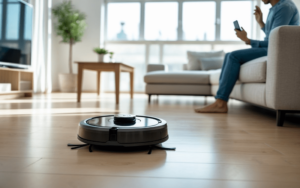In an era where health and technology intersect seamlessly, investing in the best smart water filters is becoming increasingly important for many households.
Smart water filtration systems offer a blend of convenience and advanced technology. They ensure that your family has access to clean drinking water with reduced contaminants.
These filters effectively improve water quality, making them a crucial component of any healthy home.
Smart water filtration systems utilize technology to monitor water quality and filter efficiency, often sending notifications for maintenance needs.
They serve as the cornerstone of healthy home essentials, offering peace of mind with their promise of cleaner, safer drinking water.
Households investing in these systems can significantly enhance their everyday water use quality.
Options vary from under-sink installations like the top-rated iSpring RCC7 system to whole-house solutions such as the SpringWell CF1.
Both provide tailored solutions for specific needs, ensuring that your home’s water purifier setup is both effective and efficient.
Please note that this article contains affiliate links. As an Amazon Associate, we earn from qualifying purchases at no extra cost to you.
Understanding Water Filtration Technology
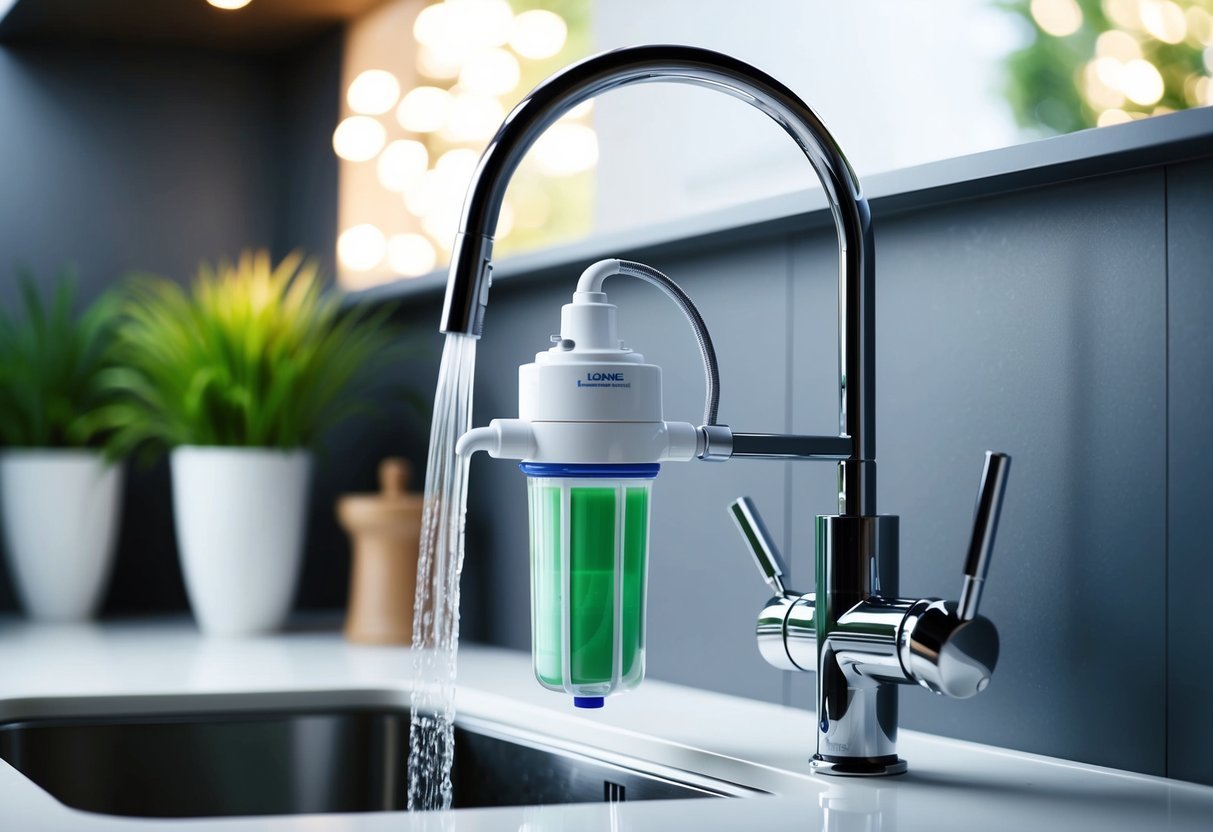
Modern water filtration technology provides a range of solutions for improving drinking water quality. Different filter types perform unique functions, while smart technology introduces innovative ways to monitor and enhance water safety and taste.
Types of Water Filters
Water filters come in various types, each targeting specific contaminants.
Activated carbon filters excel in removing chlorine, sediment, and volatile organic compounds, improving taste and odor.
Reverse osmosis systems are effective in removing dissolved solids and metals.
Ultraviolet (UV) filters target and eliminate bacteria and viruses, ensuring microbiological safety.
Lastly, ion exchange resins effectively soften water by reducing hardness ions like calcium and magnesium.
For households with varied needs, combining these technologies can address most water quality issues. Researching specific water concerns and budget constraints is crucial for making an informed decision.
We may earn a small commission if you purchase through this link. Thank you for supporting our content!
How Smart Water Filters Work
Smart water filters leverage advanced features like sensors and connectivity to improve performance.
These systems monitor flow rates and contaminant levels, sending real-time alerts to users when maintenance is required or filter capacity is reached.
Through apps and smart home integrations, users can track usage patterns and receive reminders for filter replacements.
These advances provide not only convenience but also detailed insights into water consumption and quality.
Some smart filters also offer compatibility with other smart appliances, creating an integrated home environment.
The ability to track efficiency and conduct diagnostics ensures that users maintain optimal water quality.
Benefits of Smart Water Filtration
Smart water filtration systems offer numerous advantages for users prioritizing water quality and convenience.
They enhance safety by ensuring timely replacement of filters and reducing the risk of impurity breakthrough.
With better tracking, they promote cost-effectiveness, as users only replace filters when necessary, reducing waste.
These systems also provide peace of mind, showing detailed reports on water quality.
The integration with smart home devices allows for better control and customization, adapting to individual needs.
For families, this ensures healthier water consumption while minimizing environmental impact.
Concierge-style reminders and updates transform water filtration from a basic utility to an intelligent, user-friendly solution.
Selecting the Right Smart Water Filter
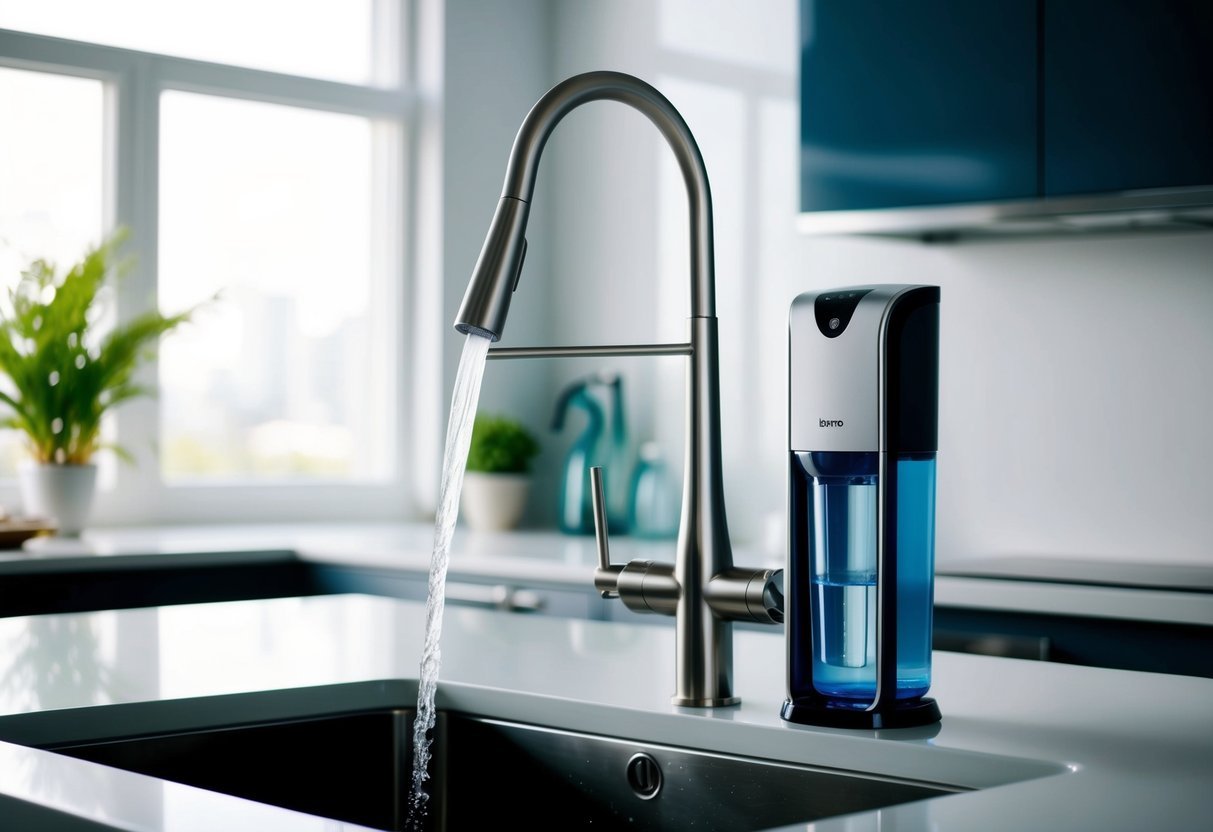
When choosing a smart water filter, it’s crucial to evaluate water quality needs, assess the filter’s capacity, and identify essential features.
A well-informed decision ensures you select a filter that fits your home and meets your unique requirements.
Water Quality Analysis
Before investing in a smart water filter, it’s vital to understand the specific contaminants present in your household water supply.
Start by conducting a water quality test, which can help identify common pollutants such as lead, chlorine, or heavy metals.
This step ensures selecting a filter specifically designed to handle these contaminants effectively.
Local water reports are often available through municipal services, providing insight into the typical issues with your water supply.
Matching a filter to your specific needs can greatly improve the water quality, whether you’re dealing with unpleasant odors, taste issues, or health-related contaminants.
Capacity and Size Considerations
The capacity and size of the water filter play a crucial role in selecting the right model.
It’s important to consider the daily water consumption of your household.
Smaller units, such as those used in under-sink applications, might suffice for individual or small family use.
For larger households or those with high water consumption, larger systems such as reverse osmosis systems are better equipped to handle greater demands.
Additionally, assess the installation space available, as some systems require more room than others.
Features to Look For
Smart water filters come with a variety of features designed to enhance functionality and convenience.
Key features include Wi-Fi connectivity for monitoring usage and filter status via smartphone apps.
Automatic filter replacement reminders ensure timely maintenance, avoiding the pitfalls of untreated water.
Consider models with multiple filtration stages to address a broader spectrum of contaminants.
Options such as UV sterilization or activated carbon filters can be particularly effective for certain pollutants.
Evaluate these features to ensure your smart filter meets both your water quality expectations and fit within your lifestyle.
Installation and Maintenance
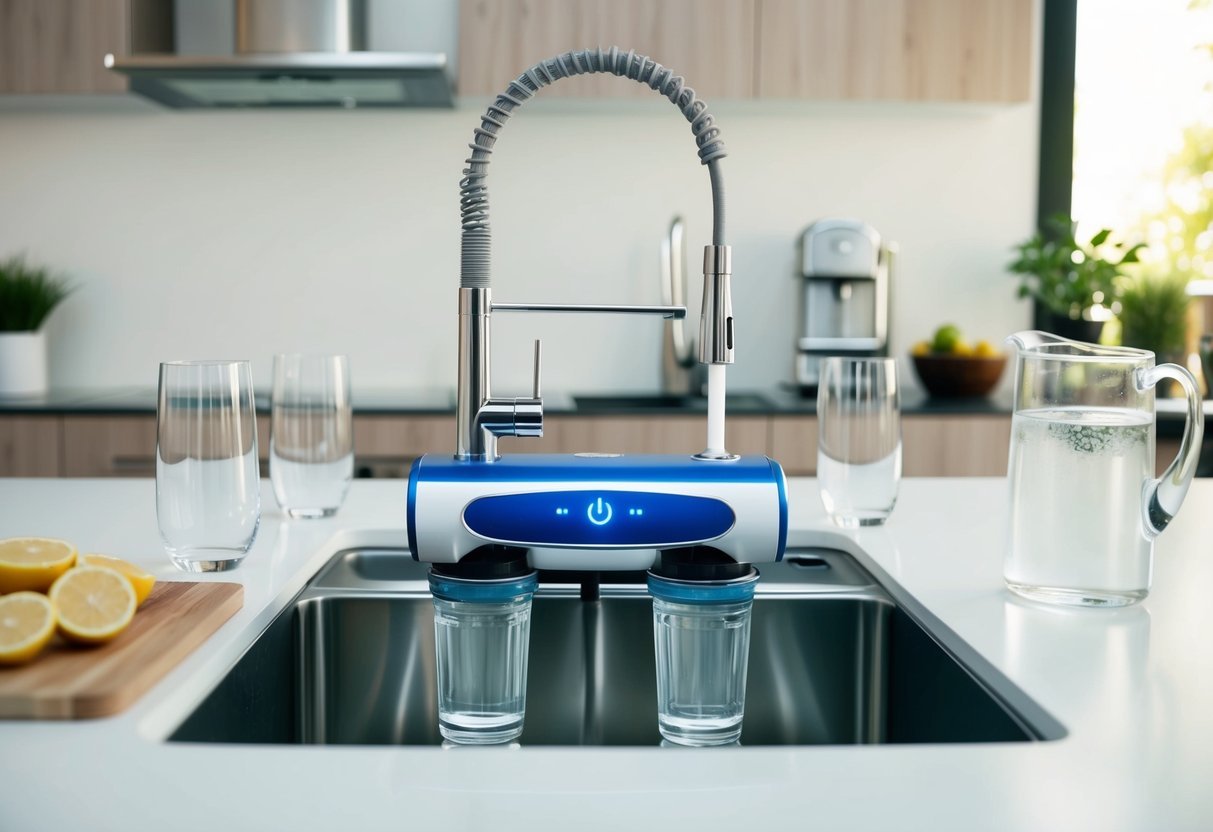
Smart water filters are designed to improve the quality of drinking water through advanced filtration technology. This section covers key aspects of installation, maintenance, and troubleshooting to ensure optimal performance and longevity.
Installation Process
Installing a smart water filter generally requires basic tools and can be handled by most DIY enthusiasts.
Start by shutting off the water supply to prevent leaks.
Follow the manufacturer’s instructions for attaching the filter to the water line, ensuring all connections are tight.
Use a wrench to secure fittings without overtightening, which can cause damage.
Some filters require synchronization with smart home systems.
Download the relevant app, connect the device to Wi-Fi, and follow the setup prompts.
Ensure the filter is mounted securely, allowing enough clearance for easy access during maintenance.
Maintenance Tips
Regular maintenance is crucial for effective performance.
Replace filter cartridges as per the manufacturer’s guidelines, usually every six months.
Set reminders using built-in functionalities or a smartphone app to keep up with the schedule.
Inspect for any leaks around the connections frequently.
Periodically clean the exterior of the unit to prevent dust accumulation.
For models with smart capabilities, ensure firmware is up to date to benefit from the latest features and security updates.
Troubleshooting Common Issues
If the filter experiences reduced water flow, check for blockages in the filter cartridge.
If issues persist, consider replacing the cartridge to restore optimal flow.
Odd tastes or odors may indicate a need for a new filter sooner than expected.
Check that all connections remain leak-proof and secure.
In cases of app connectivity issues, verify that the device is within Wi-Fi range.
Restart your router and the filter’s smart unit if connectivity problems continue.
Consult the manufacturer’s support for unresolved issues or technical assistance.
Smart Water Filter Reviews
Smart water filters are transforming how households ensure clean water access. Evaluating the market’s best models reveals differences in technology, efficiency, and user satisfaction. These factors guide potential buyers toward systems that fit their needs.
Comparison of Top Models
The iSpring RCC7, recognized for its contaminant removal capabilities, is the leading candidate among under-sink options. Offering effectiveness at a reasonable price, its performance stands out.
For whole-house systems, the SpringWell CF1 is noteworthy for its ability to eliminate common city water pollutants. Its cutting-edge technology and capacity serve larger households effectively.
Among pitchers, the Brita Elite Filter is ANSI/NSF-certified for reducing a broader range of contaminants. The model’s performance makes it appealing to those seeking a simpler, portable solution.
We may earn a small commission if you purchase through this link. Thank you for supporting our content!
Customer Feedback and Ratings
Feedback for the iSpring RCC7 highlights its reliability in maintaining water taste and purity, earning it high ratings by homeowners appreciating value for money.
The SpringWell CF1 receives praise for easily integrating with existing plumbing systems. Users comment on noticeable improvements in water quality, making it popular among larger families.
Brita Elite Filter impresses with its simplicity and efficiency. Customer reviews often mention the convenience of its design, making it a favorite for individuals prioritizing ease of use without compromising on filtration effectiveness.
Sustainability and Environmental Impact
Incorporating smart water filters in homes can significantly reduce plastic waste, as they negate the need for bottled water.
Additionally, the energy efficiency of these systems can help decrease the overall energy consumption while maintaining high-quality water filtration.
Reducing Plastic Waste
Smart water filters contribute to sustainability by minimizing the reliance on single-use plastic bottles.
Every year, millions of tons of plastic waste accumulate in landfills and oceans, largely attributed to bottled water consumption.
By opting for a smart filtration system, households can utilize tap water, which is filtered and purified, eliminating the need for bottles.
Eco-friendly filters, such as those using activated carbon or ceramic technologies, are designed to last longer.
This not only reduces waste related to cartridge replacements but also lessens the plastic footprint of homes.
Systems that use sustainable materials emphasize eco-consciousness, focusing on durability and reduced environmental impact.
Eco-friendly filtration systems highlight the importance of sustainable water filtration. These approaches integrate the use of sustainable materials and processes, further supporting environmental conservation efforts.
Energy Efficiency
The energy efficiency of smart water filtration systems plays a crucial role in their sustainability. These systems are designed to optimize power consumption, ensuring that water purification requires minimal energy.
Energy-efficient models can significantly lower household energy bills and reduce the carbon footprint.
Advanced systems, like those incorporating ultraviolet (UV) filtration, effectively kill bacteria and pathogens without the use of chemicals, functioning at reduced power levels.
Incorporating energy-efficient systems can lead to substantial savings on energy costs and contribute to a greener environment.
Selecting the right filtration system involves balancing water purity with energy use. Efficient designs focus on minimizing power while maintaining performance, aligning household practices with environmental conservation efforts.
Frequently Asked Questions
Choosing the right smart water filter for your home involves considering the effectiveness of various systems, including reverse osmosis and countertop models. The health benefits and recommendations by consumer reports also play a crucial role.
What are the top-rated water filtration systems for home use?
Many experts recommend the iSpring RCC7 as an excellent under-sink option. It excels in removing contaminants and improving water taste while remaining affordable.
Whole-home systems that use carbon or charcoal are effective, as they filter water as it flows through, removing a broad range of impurities.
How do reverse osmosis water filters compare to other water purification methods?
Reverse osmosis (RO) filters are known for their ability to remove a wide spectrum of contaminants, including heavy metals and microbes. They often outperform other methods in terms of purification, though they can be more expensive.
RO systems also produce wastewater, which may be a consideration for environmentally conscious consumers.
What criteria should be considered when selecting a water filter pitcher?
When choosing a water filter pitcher, consider the filter’s ability to remove specific contaminants, its lifespan, and the cost of replacement cartridges.
It’s also important to check the filter’s certification for removing harmful substances like lead and chlorine. User reviews regarding taste and ease of use can provide additional insight.
Which whole house water filters are most recommended by consumer reports?
Whole house water filters, such as those using a blend of filter media, are highly recommended for their comprehensive filtration capabilities.
Consumer reports often highlight filters that effectively remove common contaminants and have long-lasting media, reducing the need for frequent replacements. The ease of installation and maintenance is another factor to consider.
What is the most effective countertop water filter on the market?
Countertop water filters vary in effectiveness, but gravity-fed systems like ProOne are praised for their simplicity and efficiency.
These systems typically do not require electricity and can filter out a range of impurities. Users appreciate their ability to purify water quickly while maintaining good taste.
What are the health benefits of using a high-quality home water filter?
High-quality home water filters can significantly improve health by removing harmful contaminants such as lead, bacteria, and chlorine. This can lead to better hydration and may reduce risks associated with chronic exposure to impurities in tap water.
Clean, filtered water also enhances the flavor of beverages and cooked foods, contributing to an overall healthier lifestyle.
This article contains affiliate links, which means we may earn a commission if you purchase through our links, at no extra cost to you. As an Amazon Associate, we earn from qualifying purchases. Thank you for supporting our content!



